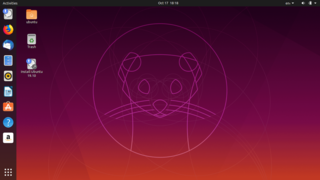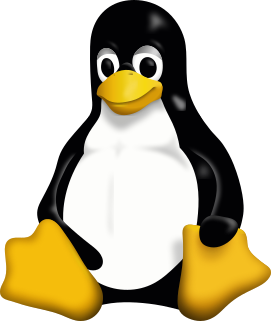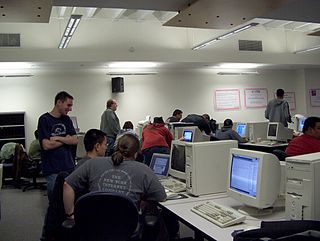
Bruce Perens is an American venture capitalist, computer programmer and advocate in the free software movement. He created The Open Source Definition and published the first formal announcement and manifesto of open source. He co-founded the Open Source Initiative (OSI) with Eric S. Raymond. Today, he is a partner at OSS Capital.

Free software or libre software is computer software distributed under terms that allow users to run the software for any purpose as well as to study, change, and distribute it and any adapted versions. Free software is a matter of liberty, not price: users—individually or in cooperation with computer programmers—are free to do what they want with their copies of a free software regardless of how much is paid to obtain the program. Computer programs are deemed free if they give users ultimate control over the software and, subsequently, over their devices.

GNU is an operating system and an extensive collection of computer software. GNU is composed wholly of free software, most of which is licensed under the GNU Project's own General Public License (GPL).

A Linux distribution is an operating system made from a software collection that is based upon the Linux kernel and, often, a package management system. Linux users usually obtain their operating system by downloading one of the Linux distributions, which are available for a wide variety of systems ranging from embedded devices and personal computers to powerful supercomputers.

GNOME Evolution is the official personal information manager for GNOME. It has been an official part of GNOME since Evolution 2.0 was included with the GNOME 2.8 release in September 2004. It combines e-mail, address book, calendar, task list and note-taking features. Its user interface and functionality is similar to Microsoft Outlook. Evolution is free software licensed under the terms of the GNU Lesser General Public License (LGPL).

Ubuntu is a free and open-source Linux distribution based on Debian. Ubuntu is officially released in three editions: Desktop, Server, and Core for the internet of things devices and robots. All the editions can run on the computer alone, or in a virtual machine. Ubuntu is a popular operating system for cloud computing, with support for OpenStack.

Free and open-source software (FOSS) is software that can be classified as both free software and open-source software. That is, anyone is freely licensed to use, copy, study, and change the software in any way, and the source code is openly shared so that people are encouraged to voluntarily improve the design of the software. This is in contrast to proprietary software, where the software is under restrictive copyright licensing and the source code is usually hidden from the users.
Linux adoption is the adoption of Linux computer operating systems (OS) by households, nonprofit organizations, businesses, and governments.

Linux is a family of open source Unix-like operating systems based on the Linux kernel, an operating system kernel first released on September 17, 1991, by Linus Torvalds. Linux is typically packaged in a Linux distribution.

LugRadio was a British podcast on the topic of Linux and events in the free and open source software communities, as well as coverage of technology, digital rights and politics.
GNU variants are operating systems based upon the GNU operating system. According to the GNU project and others, these also include most operating systems using the Linux kernel and a few others using BSD-based kernels.

The Linux Foundation (LF) is a non-profit technology consortium founded in 2000 as a merger between Open Source Development Labs and the Free Standards Group to standardize Linux, support its growth, and promote its commercial adoption. It also hosts and promotes the collaborative development of open source software projects.
In the 1950s and 1960s, computer operating software and compilers were delivered as a part of hardware purchases without separate fees. At the time, source code, the human-readable form of software, was generally distributed with the software providing the ability to fix bugs or add new functions. Universities were early adopters of computing technology. Many of the modifications developed by universities were openly shared, in keeping with the academic principles of sharing knowledge, and organizations sprung up to facilitate sharing. As large-scale operating systems matured, fewer organizations allowed modifications to the operating software, and eventually such operating systems were closed to modification. However, utilities and other added-function applications are still shared and new organizations have been formed to promote the sharing of software.
Opposition to software patents is widespread in the free software community. In response, various mechanisms have been tried to defuse the perceived problem.
Linux began in 1991 as a personal project by Finnish student Linus Torvalds: to create a new free operating system kernel. The resulting Linux kernel has been marked by constant growth throughout its history. Since the initial release of its source code in 1991, it has grown from a small number of C files under a license prohibiting commercial distribution to the 4.15 version in 2018 with more than 23.3 million lines of source code, not counting comments, under the GNU General Public License v2.

A Linux User Group or Linux Users' Group (LUG) or GNU/Linux User Group (GLUG) is a private, generally non-profit or not-for-profit organization that provides support and/or education for Linux users, particularly for inexperienced users. The term commonly refers to local groups that meet in person, but is also used to refer to online support groups that may have members spread over a very wide area and that do not organize, or are not dependent on, physical meetings. Many LUGs encompass FreeBSD and other free-software / open source Unix-based operating systems.

Linspire is a commercial operating system based on Debian GNU/Linux and Ubuntu and currently owned by PC/OpenSystems LLC. From 2001 to 2008, it was owned by Linspire. Inc., and from 2008 to 2017 by Xandros.
Long-term support (LTS) is a product lifecycle management policy in which a stable release of computer software is maintained for a longer period of time than the standard edition. The term is typically reserved for open-source software, where it describes a software edition that is supported for months or years longer than the software's standard edition.
Microsoft, a technology company once known for its opposition to the open source software paradigm, turned to embrace the approach in the 2010s. From the 1970s through 2000s under CEOs Bill Gates and Steve Ballmer, Microsoft viewed the community creation and sharing of communal code, later to be known as free and open source software, as a threat to its business, and both executives spoke negatively against it. In the 2010s, as the industry turned towards cloud, embedded, and mobile computing—technologies powered by open source advances—CEO Satya Nadella led Microsoft towards open source adoption although Microsoft's traditional Windows business continued to grow throughout this period generating revenues of 26.8 billion in the third quarter of 2018, while Microsoft's Azure cloud revenues nearly doubled its revenue. Microsoft open sourced some of its code, including the .NET framework and Visual Studio Code, and made investments in Linux development, server technology, and organizations, including the Linux Foundation and Open Source Initiative. Linux-based operating systems power the company's Azure cloud services. Microsoft acquired GitHub, the largest host for open source project infrastructure, in 2018. Microsoft is among the site's most active contributors. This acquisition lead a few projects to migrate away from GitHub. This proved a short lived phenomena because by 2019 there were over 10 million new users of GitHub.










